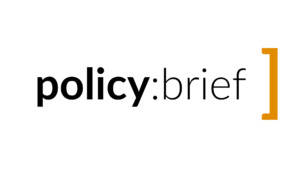13. Februar 2025
policy:brief no. 1 | Strengthen, Protect, Prevent?
The Role of Prevention of Islamism in Democratic Societies
Download the policy:brief no. 1 here.
A holistic approach to the prevention of Islamism must build on actions by both civil society and the security authorities. The role that civil society plays in prevention work is to make society as a whole more resilient by promoting common and democratic values. That is why the logic of interdiction, which appears to be an inherent part of “prevention,” cannot serve as guiding principle for designing civil society infrastructure for the prevention of extremism. In fact, such infrastructure works best in situations where state actors, due to the limits set by law, have little or no scope to act. Civil society prevention work is therefore not a model that competes with other approaches. Rather, the perspectives of all actors complement each other to form a holistic approach in which adherence to and respect for different perspectives is key to success.
Recommendations for action:
Looking to the future, it is essential to
- Understand that civil society structures, as they exist today, are part of the core concepts of internal security and to think about them accordingly in the long term and institutionally. A new interpretation of the funding structure should aim for the consolidation of existing actors, projects, and networks. This would also help promote and support transparency and quality management and establish points of contact beyond the regional level. It is equally important to recognize that extremist ideologies often interact with each other and can sometimes be mutually enabling and reinforcing. It is therefore necessary to observe these phenomena continuously and comprehensively to ensure that prevention work can address extremist ideologies in all their complexity.
- Instead of concentrating on more restrictive residence laws, the focus should be on defining and differentiating content more precisely, based on the criteria laid down in constitutional law. Just as in the field of right-wing extremism, the prevention of religious extremism must also be operationalized in terms of content. This requires expertise from civil society, academic institutions, and security authority sectors. A clear legal basis must be created that defines the line between anti-constitutional content and freedom of expression.
- Given the current situation, in which recent developments and dynamics appear to be intensifying with regard to extremism of all kinds, further professionalization of existing structures is essential. This applies in particular to dealing with extremist content in the digital space. To prevail against Islamist propaganda online requires sustainable and comprehensive prevention approaches and joint strategies. Here, too, cooperation between relevant state actors and civil society organizations is essential to expand and multiply approaches and opportunities for action.
Download the policy:brief no. 1 here.
Your contact persons
For content-related inquiries: Miriam Katharina Heß
For press inquiries: Charlotte Leikert
The Authors
Miriam Katharina Heß has been an Advisor for International Cooperation and Counter-Terrorism Analysis at BAG RelEx since 2025. Until December 2024, she was serving as an Expert on Religiously Motivated Extremism at BAG RelEx. She studied National and International Administration and Policy at the University of Potsdam, as well as Political Science at the University of Hamburg. Currently, she is pursuing her PhD at the University of Leipzig, where she examines the security rhetoric surrounding terrorism in the context of securitization in Germany.
Ivo Lisitzki has been an Advisor for Policy and European Networking at BAG RelEx since 2025. Until December 2024, he was serving as an Expert on Religiously Motivated Extremism at BAG RelEx. He studied Political Management (BA) and International Relations Middle East (MA) in Bremen, Istanbul, and Durham.
Jamuna Oehlmann serves as the Executive Director of the German Council on Preventing Extremism (BAG RelEx) and has been leading the project “Alliance for Islamism Prevention and Democracy Promotion” since January 2024. From 2020 until the end of 2024, Jamuna coordinated the Competence Network “Islamist Extremism” (KN:IX). With degrees from Berlin, Bangkok and London, she has an academic background in Asian Studies, International Relations and Diplomacy. Her studies focused particularly on international security and terrorism issues.
About policy:brief
The BAG RelEx policy:brief summarizes positions and insights from our work, with a particular focus on current socio-political issues and challenges. On the one hand, the policy:brief takes a step back to explain connections; on the other, it moves a step forward by providing target-group-oriented and appropriate policy recommendations. This ensures that our work, as well as that of our approximately 40 member organizations, is communicated effectively to the relevant audiences and supports exchanges with external stakeholders and actors from academia, politics, administration, and business.
Here you can find an overview of all issues.



